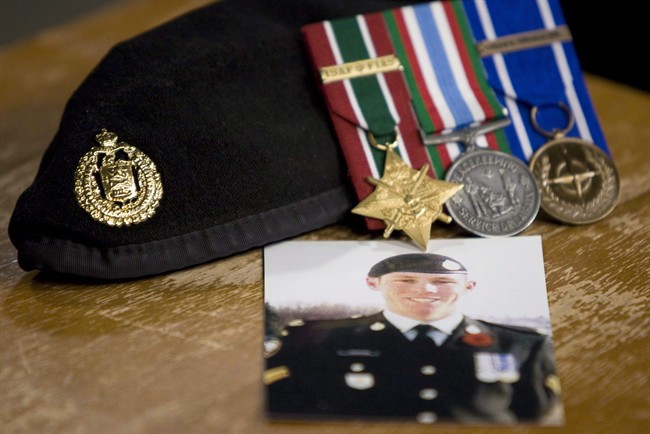Members of the army are 3.4 times more likely to kill themselves than non-army members of Canada’s Armed Forces and at least 50 per cent more likely to kill themselves than the average Canadian of the same gender and age, a new study has found.

The Canadian Forces study, posted in June but made public on Tuesday, tracked suicide rates among male Regular Force members of Canada’s military.
It didn’t look at reservists or women because the sample sizes are so small they make statistical analysis unreliable.
But the study also didn’t look at any Canadian veterans, despite calls from vets for better mental health services amid what they say is a crisis of under-treated post-traumatic stress disorder, depression and anxiety.
READ MORE: Canada still falls short in treating soldiers’ psychic wounds
Veterans weren’t included in the study because no one systematically tracks what happens to them after they leave the military.
“Veterans are people who’ve served in the military but now are no longer members of the Canadian Armed Forces. So we don’t provide them health care. We don’t find out about them when they get sick, when they die,” said Colonel Andrew Downes, Director of Mental Health for the Canadian Armed Forces.
This dearth of data is a known problem: Veterans ombudsman Guy Parent recommended a system for tracking vets two years ago.
It still hasn’t been implemented.
READ MORE: Veterans Affairs Minister vows to change the way Canada treats vets
“The challenge for veterans is they truly have returned to the civilian sector,” Downes said.
“They’re not lost completely, but they’re very hard to track.”
Nonetheless, Downes says this study will translate “into concrete action” for people who are still in the military.
“This helps inform us about our programs and services for currently serving members.”
This is the first report to break down suicide rates between different branches of the Canadian Armed Forces.
And it indicates members of the army are far more likely to kill themselves.
Between 2010 and 2014, the suicide rate per 100,000 was more than 40 for army members, compared to about 12 for non-army members.
And army members’ suicide rate was 50 per cent higher than the age-standardized Canadian average in 2007-2011, the most recent year for which there’s Statistics Canada data available for the Canadian population.
This is probably due to the increased deployment stressors on army members, Downes said.
“More army people are deployed to more hostile spots. The more hostile the place you go, the higher your rate of mental illness,” he said.
“So it should be no surprise these are the people that are choosing suicide.”
Downes emphasized the military has done a lot over the past several years to help its members get the treatment they need.
But “the information is telling us more needs to be done,” he said. Part of that is reducing the barriers to coming forward to get help.
“We’ve been putting a lot of effort into culture change and trying to instill a climate in which asking for care is good and encouraged,” he said.
“Culture change is hard. It takes a long time. … We need to think of mental illness like we think of physical illness.”
Downes points to this study and others like it as proof this is an important issue to the military.
“The fact that we do this report … really indicates that we are interested in this and we are trying to solve the problem,” he said.
“When it comes to suicide, suicide is a Canadian problem. It’s a human problem. It’s a global problem.”
But he notes that, even in the best-case scenario, “suicides are very difficult to prevent.”
“We’ve known for a long time that war causes casualties. Physical, mental casualties,” Downes said.
“We can’t grow people’s limbs back. And, with mental illness, even the best care that is available does not cure 100 per cent of people.”
INVISIBLE WOUNDS: Crisis in Canada’s military
National Defence Minister Jarjit Singh Sajjan said in a statement Tuesday he’s asked Canada’s Chief of Defence Staff to make the issue of military suicide a priority.
“Throughout my career I have seen first-hand the demands of military service, and the sometimes enormous impact it can have on members and their families,” the statement reads.
“I am concerned about the findings of the recent CAF report indicating an increased rate of suicide amongst CAF members. As Minister, taking care of our people is my personal priority.”




Comments